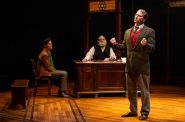Soulstice Theatre’s American Enterprise echoes today’s headlines
For George Pullman, an iconic figure in American industrial history, adherence to principle was both a virtue and a curse. Soulstice Theatre opened American Enterprise, a play drawn from Pullman’s life, Thursday night (April 28). The play is at its core a personal tragedy. Beyond that core, the play reflects American struggles with the social contract between management and workers.
Pullman was an American entrepreneur in the late 19th century — America’s gilded age. His genius lay in creation of a system of Pullman railroad cars, which replaced uncomfortable passenger experiences with luxury amenities. At one point, he ran America’s largest hotel, as nearly 10,000 travelers spent the night on wheels in one of his Pullman Palace cars.
Pullman was also a visionary. He created a utopian environment for the workers who built the cars. He required employees to move to Pullman, the company town just south of Chicago.
Pullman, like most business leaders in his day, demanded absolute authority within his company. But Pullman went further. He determined to shape an ideal community in which he controlled all aspects of his worker’s lives, not only on the factory floor but also in their homes, their recreation and commerce. Pullman’s paternalism contrasted with other industrialists, who had little thought for their workers at all.
The depression of 1893-94 hit Pullman hard. The company slashed worker’s wages to survive. Workers formed a union, resulting in a major national strike. Worker’s lives, the community, the company and Pullman’s standing unraveled.
At Soulstice, 11 actors tell the story in a mix of narration, song and dozens of character roles. The impact is heightened because it’s all true. The vision and the contradictions are all exposed. Pullman’s unswerving faith in his vision and unwillingness to bend is at the heart of the personal story. The economic and political history of the era are reflected in the attitudes of Chicago industrialists, workers finding their voice and politicians trying to find their balance in the struggles between the two.
At times the play is sympathetic to Pullman’s actions to cut wages; he kept the business and jobs going while he lost money. But the result was devastating to the workers.Wages fell 70% and more even as rents held firm in the company town.
The totally dependent Pullman workers naturally connected all their problems to the company. Today’s workers do not see the result in as clear a fashion. They pay some one else the rent, buy food and gas in many places, build debt to survive. At the Pullman Palace Car Company, the paycheck told the whole story. A net paycheck of pennies left workers so literally starved that a state-wide charity campaign was launched to help them. And yet, Pullman paid stockholders and preserved management salaries even in the worst of times.
Soulstice Theatre has created an effective production on a bare-bones budget. Costume changes from suits and tails to informal dress enable the ensemble cast to slip from corporate to worker roles. Several ensemble actors stand out: Brian Faracy, as a parish priest who justifies the company position through scripture; Paul Pfannenstiel, as a union organizer; and Shannon Nettesheim, as a seamstress at the plant who finds her voice on behalf of the workers. David Ferrie embodies George M. Pullman and his unswerving commitment to principle. Charles Lynch effectively portrays J. Patrick Hopkins, a young worker who rises from shop floor to management to advocate for workers and then to election as Chicago’s mayor. Hopkins’ confidence is slow to develop; his passion to do what is right evolves with circumstance. His evolutions contrast with Pullman’s unchanging certainty and failure to read change in the world around him.
History buffs will love this play. Anyone can schedule a train ride to Chicago with a Metra connection to the Pullman neighborhood and visitors center, to tour a nearly intact nationally registered historical site. Those drawn into the drama in current Wisconsin politics should see this play as well. The parallels are thought provoking, but not rhetorical. This iconic event in our past is a useful lens to contemplate our future. Those who love theater will find this production creative and stimulating. A complex historical story is conveyed in engrossing fashion.
The play doesn’t tell the whole Pullman story. Race issues do not come into play. Pullman staffed his rolling hotels with former house slaves, and The Pullman Company was the largest employer of African Americans in the 19th century. But they did not work in the factory or live in the company town. Their efforts to build a union to address their social contract with Pullman came several decades later.
American Enterprise runs Fridays and Saturdays through May 14 at the Marian Center for Non-Profits, 3211 S. Lake Drive, in St. Frances. Tickets are $15 and $12; all shows begin at 7:30 p.m. Call 414 431-3187 or visit the Soulstice website to order.
For years, Soulstice has been cramming audience and cast onto the intimate stage of a large auditorium in a former high school at the Cousins Center. Beginning July 28th, with a production of Seussical the Musical, they will move to converted warehouse space also in St. Francis. (Volunteers to assist with the move are encouraged to call Soulstice.)
Theater
-
‘L’Appartement’ Is a Mind-Bending Comedy
 Mar 25th, 2024 by Dominique Paul Noth
Mar 25th, 2024 by Dominique Paul Noth
-
‘The Mountaintop’ Offers Very Human Martin Luther King Jr.
 Mar 11th, 2024 by Dominique Paul Noth
Mar 11th, 2024 by Dominique Paul Noth
-
‘The Chosen’ Is Subtly Powerful Drama
 Mar 10th, 2024 by Dominique Paul Noth
Mar 10th, 2024 by Dominique Paul Noth


















my interest was piqued until i came to the Barndt’s line, “But the ultimate sense of entitlement by corporate leaders and the continued contradictions between the perspectives of business and of workers echo in Wisconsin today.”
why is Barndt’s personal opinion tucked into this theater review??? this is no place for it. ON STAGE…yes. not here. a simple, general statement on the current political climate in Wisconsin as it relates to this play (or vice versa) would have sufficed.
shame on you, Mr. Barndt.
I have followed the political climate on Television so much lately. I attended the show, and found it slow moving and in some cases it looked like a pagent. Especially the costumes. Mens suit jackets that were altered in some weird way to look period, but they looked all wrong. Plastic straw hats. That is far from any professional look, as it looks just like some pagent. The lead male is strong, and shines while the other cast members try very hard to sing and act, a long, and extremely wordy script.
@jeff: GE pays no taxes. Their employees pay taxes.
Banks get bailed out. Their customers do not.
It’s not Barndt’s opinion — it’s the truth.
Mr. Barndt: Soulstice Theatre has used multiple performance spaces within the Marion Center for Non-profits (not the Cousins Center), the main auditorium among them. There have in fact been relatively few productions during which the audience was situated on the auditorium stage.
“Soulstice did not anticipate the current relevance of this 1991 play, by Chicago playwright Jeffrey Sweet, when the company scheduled it.” I disagree. Certainly, the scope of this state’s recent labor dispute was not entirely predictable. But it seems likely Soulstice chose to produce this play because they absolutely *did* anticipate its relevance, given the current political and economic climate.
And Jeff: A poorly-written review is no reason not to see a play. If your interest was piqued, go see it!
Thanks for the corrections. I had not seen Soulstice in the other settings. Actually, sharing the stage with the actors has the benefit of bringing everyone close to the action.
Many of us remember the St. Francis Seminary, then the Cousins Center but the Marion Center more recently has served as an important home and resource for small nonprofit organizations.
The play reflects a period when corporations were outspoken in the belief that workers had few rights, other than to work somewhere else. That explicit attitude did not surface again until very recently, making the play more relevant than had been anticipated.
The play was designed as a pageant, in that is uses a format known as “story theater” – such as in productions of Nicholas Nickleby. Certainly, the consequences of a low-budget production are evident and the production mixed accomplished and less experienced actors. But the play worked for me. The story unfolded with substantial detail, but that ensured a more complete set of perspectives – allowing the playwright to remain somewhat more neutral than I may have been.
Ccultural reviews are always going to be from the audience viewpoint rather than the actors’ viewpoint, which they have gained through professional study and work. The audience comes in raw and can only learn from the actors. Which means that because the people who fill the house have just come away from life experiences very different from the intense, focused study the actors have been involved in, it is to be expected, and even encouraged as a challange or inspiration, that external factors of a predictable nature are going to surface and also be shared between members of the audience, and these things will seem out of place and en dehors to art and will bother those most sensitive, but the performers must accept this with patience and expect it while at the same time never letting go of their belief in their work.